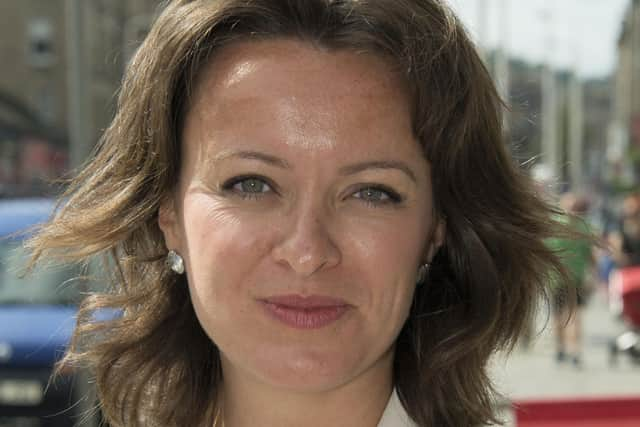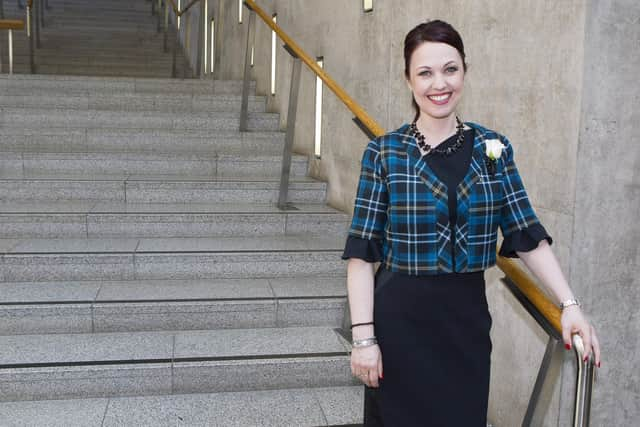Covid should force Scottish Parliament into being family friendly, say MSPs
Despite the original intentions for the Scottish Parliament to be more nine-to-five and allow MSPs to have a more normal home life than MPs in Westminster, the demands of increasingly late sittings, a lack of on-site childcare and a refusal to introduce proxy voting and remote voting before the pandemic has seen many female politicians decide to bow out of parliamentary politics.
Scottish Labour’s Jenny Marra, Scottish Conservative Ruth Davidson, SNP MSP Gail Ross and government minister Aileen Campbell are all quitting Holyrood this week when Parliament rises for the election campaign, citing the incompatibility of politics and family life.
Advertisement
Hide AdAdvertisement
Hide AdHowever, the Covid pandemic saw the introduction of remote voting and debating as MSP numbers in the Chamber were restricted and there are now hopes the Parliament will not roll back the technological changes.


Ms Marra, who lives in Dundee and has two children aged four and 11 months, says: “It has taken Covid to force a change – one that some of us were demanding, but had been refused. Myself and Gail Ross had raised these suggestions with the Presiding Officer and the Scottish Parliament Corporate Body several times and were told that remote voting wasn’t possible.
"So it wasn’t possible when women were asking for it to help us balance our work and home lives, but it was when there was a pandemic. It begs the question how much priority is given to being a family-friendly Parliament and helping women stay in politics.”
She added: “When I was on maternity leave I asked for a proxy vote, but was told by the Presiding Officer you had to be in the chamber to listen to the debate to be able to vote, so that wasn’t allowed.
"Yet down in Westminster, Stella Creasy was afforded that option. Of course women who take maternity leave can also then find their voting record is interrupted, which could penalise them when they come to stand for selection for the next parliamentary term.


"And Westminster is also ahead of Holyrood now in terms of childcare. There is a full-time nursery available, compared to a creche where you’re only allowed four hours. I also once had to miss making a speech in a budget debate because the creche texted me saying my son was crying.”
Ms Marra believes the Parliament could also be far more flexible in the time of day debates are held and when voting has to take place. She points to the Northern Ireland executive where most voting is done on one day.
“In the last week we’ve had votes as late as 9pm – that is not a family-friendly Parliament,” she says.
Advertisement
Hide AdAdvertisement
Hide AdFor Ms Ross, who represents the Caithness, Sutherland and Ross constituency, her time at home was further impacted as a lack of public transport on Thursday nights meant she could not travel north.
In her last speech to the Parliament, during International Women’s Day, she said the biggest challenge she had faced in the past five years was “trying to influence or, at least, to educate people on the difficulties of being present in the Scottish Parliament building for so many days every week”.
“In that sense, the Parliament has to have a long, hard look at how it encourages people – especially women – to become elected members,” she said.
"There has to be more flexibility in work practices, and remote and virtual working, which I was told was not possible only a month before we were forced into that way of working by the pandemic, must become the norm.
"Otherwise, more people like me and others who will speak in the chamber and remotely will be forced into making a decision either to leave or not to stand at all. That is not good for our democracy.”
Johann Lamont, a Scottish Labour MSP for the past 21 years, is also standing down, but she says that despite the rhetoric when the Parliament opened, it had never been genuinely family friendly.
“My children were two and four when I was first elected and I can only remember that time as being one of having to run everywhere,” she said.
"I remember being very stressed at the realisation this wasn’t actually a nine-to-five job. I have raised the issue of “presentee-ism” in the Parliament and with party whips ever since, but I was accused of not wanting to do my job, which was ridiculous.
Advertisement
Hide AdAdvertisement
Hide Ad"The pandemic has shown that the Parliament can function when MSPs are working from home or their constituency offices, and that needs to continue or more parents will leave.”
Talat Yaqoob, co-founder of Women 50:50, the campaigning organisation to have more women represented in Scottish politics, said “serious change across political culture” was required if that was to be made a reality.
She said: “The Scottish Parliament must lead by example here. That means making the ‘family friendly’ working hours which were one promised a reality, and making remote voting by MSPs available as standard practice, not simply as a response to the pandemic.”
Ruth Wilkinson, Glasgow candidate for the Women’s Equality Party, said it was “concerning, but not surprising” that female MSPs with young children were leaving Holyrood.
A Scottish Parliament spokesperson said: “The Parliament introduced remote voting during 2020 in response to the pandemic. It would be up to Parliament as a whole whether to retain this in the longer term.
“Holyrood’s free public creche is primarily for people visiting the building to help them engage with MSPs and Parliament. The creche service is due to be reviewed later in 2021.”
A message from the Editor:Thank you for reading this article. We're more reliant on your support than ever as the shift in consumer habits brought about by Coronavirus impacts our advertisers.
If you haven't already, please consider supporting our trusted, fact-checked journalism by taking out a digital subscription.
Comments
Want to join the conversation? Please or to comment on this article.